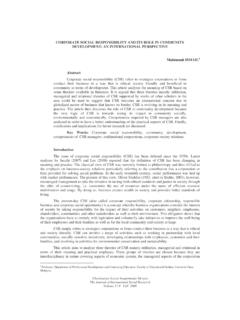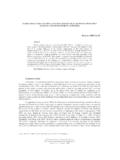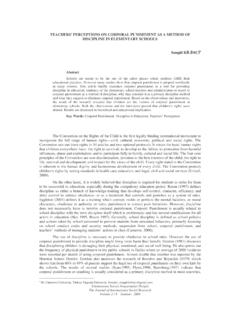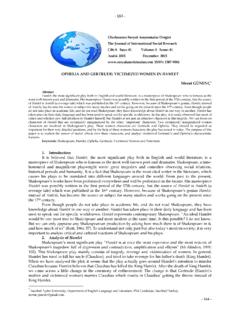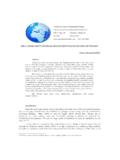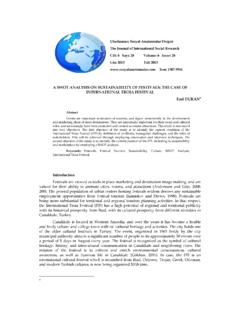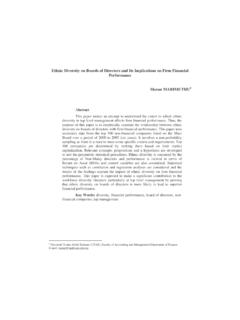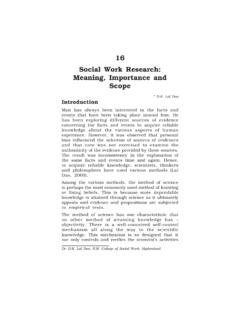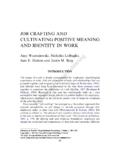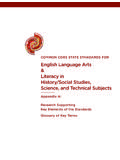Transcription of A General Perspective on Role of Theory in …
1 A General Perspective on Role of Theory in Qualitative research Mehdi TAVALLAEI * Mansor ABU TALIB** Abstract There is a growing interest on qualitative methodology as evidence by an increasing number of qualitative research design employed in social science researches. In qualitative inquiry process, the role of Theory in the field of social science and where it situates in the research framework has always created a challenge for the researchers. However, inconclusive and differing opinions have so far been documented about the role and position of Theory in qualitative research . The purpose of this paper is to build a General Perspective in terms of the position of Theory in qualitative research methodology applicable to social science research . Review of literatures on these issues were presented and discussed. As a result, a deep comprehension of a phenomenon, event or experience in real-life cannot always or necessarily be based on Theory , yet the significant role of Theory in literature review is an undeniable fact.
2 Key Words: qualitative, social research , role of Theory , phenomenology Introduction In the last decades, research designs from qualitative approach as the practical method in different fields of study such as social sciences has shown an increasing rate. As a result, special attention to its central issues such as the importance of Theory has become a point of concern. A researcher uses qualitative research for his or her research work when an issue under study needs to be comprehended in a complex and detailed level. In this regards, researcher try to minimize the power relationship between the researcher and participants or co-researcher by empowering them to share their stories and to have their silent voices heard by a concerned expert. In addition, qualitative researcher attempts to understand the participants actual contexts or settings which are directly related to the phenomenon. Likewise, qualitative design is used when subtle issues such as gender differences, race, and economic status are the matter of concern.
3 In other instances, qualitative design was chosen when inadequate theories exist, and the possibilities that a new Theory can be developed as the result of the research . As for the research objective, McLeod (2001, ) iterated that the the primary aim of qualitative research is to develop an understanding of how the world is constructed . Silverman (2001) has stated that researchers who use the qualitative method for their work commonly believe that they can provide a deeper comprehension about the social phenomena. Still, qualitative social researches do not have a unique agreed doctrine underlying them (Silverman, 2001, p. 32). Thus, for accomplishing the purposes sought within this type of research , a precise survey of structural elements in qualitative research is desired. One of the issues which has persistently been raised as a question, and does not find a clear response in the process of this research is; what is the role and position of Theory in the structural formation of qualitative research ?
4 The purpose of this article is to build a General Perspective in terms of the position of Theory in qualitative research . A survey of literatures on different qualitative research design paves the way for this purpose. How is Qualitative research Defined? It is challenging to give a specific, valid, final and universal definition on the entity of qualitative research . Among the available definitions suggested, Denzin & Lincoln s definition in Handbook of Qualitative research is relatively a comprehensive explanation on this key term: Qualitative research is a situated activity that locates the observer in the world. It consists of a set of interpretive, material practices that make the world visible. These practices transform * Student (Family Ecology), Dept. of Human Development and Family Studies, Universiti Putra Malaysia, **Dr., Dept. of Human Development and Family Studies, Universiti Putra Malaysia, Uluslararas Sosyal Ara t rmalar Dergisi The Journal of International social research Volume 3 / 11 Spring 2010 571 the world.
5 They turn the world into a series of representations, including field notes, interviews, conversations, photographs, recordings and memos to the self. At this level, qualitative research involves an interpretive, naturalistic approach to the world. This means that qualitative researchers study things in their natural settings, attempting to make sense of, or interpret, phenomena in terms of the meaning people bring to them (Denzin & Lincoln, 2005, p. 3). Whereas, according to Clissett (2008, p. 100) qualitative research covers a wide range of approaches for the exploration of human experience, perceptions, motivations and behaviors and is concerned with the collection and analysis of words whether in the form of speech or writing. In this aspect, qualitative inquiry means to understand what others do and say or to get grasp, hear, catch and comprehend what something means (Grant, 2008, p.)
6 1). In addition, Schwandt (2007) believes that understanding is itself a phenomenon which lies at the core of the qualitative research because qualitative methodology and underlying philosophy are highly appropriate for understanding complex personal and social issues (Creswell & Clark, 2007, p. ). On the other hand, Thomson (2008) believes that a subtle difference exists between the quantitative and qualitative research methods; whereas quantitative researches often focus on measuring the parts in an issue, qualitative studies prefer to create a picture which covers the whole image in it. As for the process in qualitative research method, the researcher inevitably dives deep into the subject or phenomenon under study. Thus, in this method, numerous forms of data or information are collected for further examination through a variety of angles or from different peoples. In the final step, this data is interpreted to establish an enriched and significantly meaningful Perspective .
7 Indeed meaning is of essential concern to the qualitative research (Bogdan & Biklen, 1992, p. 32) . However, whatever the meaning derived from the data, the qualitative researcher does not make any attempt to control their subjects. In fact, he or she tries to understand the overall environment and ultimately help others gain a better understanding about how the involved participants are seeing what is really going on in that specific situation in a day to day living (Jefferies, 2005). According to Leedy & Ormrod (2005), the qualitative research method is used in the following conditions; (a) when there is rarely any information available about the topic (b) when the researcher s variables are unclear and unknown, and (c) when a relevant Theory base is missing in any sense. As such, qualitative research does not intend to test a hypothesis but this method has a deep tendency to describe, analyze, and interpret the constructive aspects of the social world (Mcleod, 2001, ).
8 Since qualitative researches are inductive, they are evaluated based on the total absence of any sort of Theory (Mitchell & Cody, 1993) and as a result it is method which helps a researcher construct a useful Theory within a research (Leedy & Ormrod, 2005 & Creswell, 2007). A Review of the Literature on Theoretical Frameworks Despite the fact that there is hardly any disagreement on the role and position of Theory in quantitative research (Creswell, 2002 & 2007), there is no clear agreement made in qualitative research regarding the role and significance of Theory . In overall, based on Anfara & Mertz (2006) there are three distinct understandings about the role of Theory in qualitative researches: (a) Theory relates to the researcher s chosen methodology and the epistemologies underlying it (Best & Kahn, 2003; Gay & Airasian, 2003 cited by Anfara & Mertz, 2006); (b) Qualitative research Theory , compared to methodology, has a relatively more broad and extensive role (Denzin & Lincoln, 2003b), and (c) Theory does not typically have a solid relationship with qualitative research (Merriam, 1997; Schwandt, 2007).
9 As it appears, the understandings are not finalized in this field of social science, and what is more, some experts have declared that there is no clear boundaries among such opinions. For instance, Merriam (2002) discussed her perception on the deep and broad influence of Theory on the research process; yet she also acknowledged methodology s part as the theoretical stances taken by a researcher. As mentioned, some researchers have pointed to Theory s role in methodological paradigms which simultaneously hint the wide role of Theory (Merriam, 2002). Thus, new researchers are facing ambiguities on two aspects; the true entity of Theory , and their rate of reliability on Theory as a major reference in their work . The point which should be understood is the different roles played by Theory in the quantitative research and the qualitative research . In quantitative research , the researcher seeks to prove and confirm his/her hypothesis through a deductive method intermingled with a number of Uluslararas Sosyal Ara t rmalar Dergisi The Journal of International social research Volume 3 / 11 Spring 2010 572 theories.
10 However, a researcher chooses the qualitative method for his/her work when there is little information about the topic and a relevant Theory base is missing (Leedy & Ormrod, 2005). Therefore the qualitative researcher intends to create an appropriate Theory which suits his topic by using the inductive method. How is a Theory Defined? The term Theory has been defined in a variety of manners depending on the field of study, ground of science and even the era it was recognized to be a vital device in the process of knowledge throughout history. One of the oldest definitions on scientific Theory was given by Hempel (1952, p. 36) who compared Theory with a complex spatial network whereby system and observation are the floating device, while rules of interpretation control and guide them. Homans (1952, p. 812) believes that essentially no Theory exists unless there is a clear explanation on the properties and propositions which clarify their relations and finally forming a deductive system.
